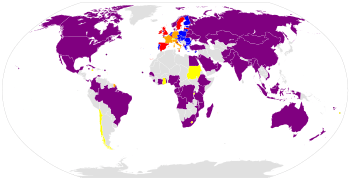Cape Town Treaty
| Cape Town Convention on International Interests in Mobile Equipment | |
|---|---|
|
Parties Signatories Parties, also covered by EU's accession Signatories, also covered by EU's accession covered by EU's accession | |
| Signed | 16 November 2001 |
| Location | Cape Town, South Africa |
| Effective | 1 March 2006 |
| Condition | 3 ratifications |
| Parties | 72 |
| Depositary | International Institute for the Unification of Private Law |
| Citations | 2307 U.N.T.S. 285 |
| Languages | English, Arabic, Chinese, French, Russian and Spanish |
|
| |
The Cape Town Convention on International Interests in Mobile Equipment, or Cape Town Treaty is an international treaty intended to standardize transactions involving movable property. The treaty creates international standards for registration of contracts of sale (including dedicated registration agencies), security interests (liens), leases and conditional sales contracts, and various legal remedies for default in financing agreements, including repossession and the effect of particular states' bankruptcy laws.
Three protocols to the convention are specific to three types of movable equipment: Aircraft Equipment (aircraft and aircraft engines; signed in 2001), railway rolling stock (signed in 2007) and space assets (signed in 2012).
The treaty resulted from a diplomatic conference held in Cape Town, South Africa in 2001. The conference was attended by 68 countries and 14 international organizations. 53 countries signed the resolution proposing the treaty .[1] The treaty came into force on 1 April 2004 ,[2] and has been ratified by 57 parties. The Aircraft Protocol (which applies specifically to aircraft and aircraft engines ) took effect on 1 March 2006 when it was ratified by 8 countries: Ethiopia, Ireland, Malaysia, Nigeria, Oman, Panama, Pakistan, and the United States.
Signatures and ratifications
As of July 2015, the convention has been ratified by 64 states as well as the European Union. The railway rolling stock and the space protocols have been ratified by respectively two countries (Luxembourg and Gabon), as well as the European Union, and no countries and thus have not taken effect. An overview of the status of the treaty and protocols is shown below:
| Instrument | Signature | Location | Entry into force | Signatures | Ratifications (required for entry into force) |
|---|---|---|---|---|---|
| Convention | 16 November 2001 | Cape Town | 1 March 2006 | 28 | 72 (3) |
| Aircraft Protocol | 16 November 2001 | Cape Town | 1 March 2006 | 23 | 65 (8) |
| Railway Rolling Stock Protocol | 23 February 2007 | Luxembourg | - | 8 | 2 (4) |
| Space Assets Protocol | 9 March 2012 | Berlin | - | 4 | 0 (10) |
In the United States, the treaty was approved by the U.S. Senate in 2003, and implemented by the full Congress in the Cape Town Treaty Implementation Act of 2004.
European Union
The European Union joined the convention and the Aircraft Protocol as a Regional Economic Integration Organization. On the subject of the convention, both the Member states of the European Union and the Union itself have competence: e.g. while the substantive law regarding insolvency is regulated by the states, the conflict of law-rules (which county has jurisdiction etc.) is regulated by the European Union. According to the Government of the Netherlands the acceptance of the European Union in a member state which itself is not a party to the convention has no practical consequences.[3] The European Union ratified the Luxembourg Rail protocol in December 2014 as a Regional Economic Integration Organization on the same basis.
Protocols

Aircraft Protocol
The aircraft Protocol (officially: Protocol to the Convention on International Interests in Mobile Equipment on matters specific to aircraft equipment) was signed immediately with the treaty and the only protocol currently entered into force. It applies to aircraft which can carry at least eight people or 2750 kilograms of cargo, aircraft engines with thrust exceeding 1,750 pounds-force (7,800 N) or 550 horsepower (410 kW), and helicopters carrying five or more passengers. The International Registry of Mobile Assets established to record international property interests in the aircraft equipment covered by the treaty is located in Ireland. Mediation cases for leasing disputes are to be heard in the High Court of Ireland.[4] As of April 2016, the protocol has 65 contracting parties, which includes 64 states and the European Union.
| Wikisource has original text related to this article: |
| State | Date of Ratification/ Accession | Comments |
|---|---|---|
| | 25 July 2006 | |
| | 30 October 2007 | |
| | 30 April 2006 | |
| | 26 May 2015 | |
| | 27 November 2012 | |
| | 15 December 2008 | |
| | 27 September 2011 | |
| | 4 July 2014 | |
| | 30 November 2011 | |
| | 14 April 2011 | |
| | 21 December 2012 | New Brunswick: effective 1 July 2016 Yukon: effective 1 October 2014 others: 1 April 2013 |
| | 26 September 2007 | |
| | 3 February 2009 | Excluding |
| | 19 February 2007 | |
| | 13 March 2013 | |
| | 6 May 2016 | |
| | 1 March 2016 | |
| | 28 January 2009 | |
| | 26 October 2015 | |
| | 10 December 2014 | |
| | 21 November 2003 | |
| | 28 April 2009 | Only as far as it has competency over subjects of the convention/protocol. Not applicable to Denmark |
| | 30 May 2012 | |
| | 31 March 2008 | |
| | 16 March 2007 | |
| | 23 August 2005 | |
| | 31 August 2010 | |
| | 1 June 2011 | |
| | 13 October 2006 | |
| | 31 October 2013 | |
| | 8 February 2011 | |
| | 27 June 2008 | |
| | 15 December 2008 | |
| | 10 April 2013 | |
| | 16 January 2014 | |
| | 1 October 2010 | |
| | 31 July 2007 | |
| | 19 October 2006 | |
| | 18 July 2013 | |
| | 3 December 2012 | |
| | 17 May 2007 | Not European Netherlands Only for |
| | 20 July 2010 | |
| | 16 December 2003 | |
| | 20 December 2010 | |
| | 21 March 2005 | |
| | 22 January 2004 | |
| | 28 July 2003 | |
| | 25 May 2011 | |
| | 28 January 2010 | |
| | 9 September 2014 | |
| | 27 June 2008 | |
| | 9 January 2006 | |
| | 26 July 2016 | |
| | 28 January 2009 | |
| | 18 January 2007 | |
| | 27 November 2015 | |
| | 17 November 2016 | |
| | 30 December 2015 | |
| | 31 May 2011 | |
| | 1 December 2011 | |
| | 23 August 2011 | |
| | 31 July 2012 | |
| | 29 April 2008 | |
| | 27 July 2015 | Extended to Cayman Islands, Gibraltar and Guernsey (2015), and the Isle of Man and Bermuda (2017) |
| | 28 October 2004 | |
| | 30 January 2009 | |
| | 17 September 2014 |
Railway Rolling Stock
| Wikisource has original text related to this article: |
The Railway Rolling Stock Protocol, or Luxembourg Rail Protocol, officially the Protocol to the Convention on International Interests in Mobile Equipment on Matters Specific to Railway Rolling Stock was adopted on 23 February 2007 at a diplomatic conference in Luxembourg and applies to railway rolling stock (broadly defined as "vehicles movable on a fixed railway track or directly on, above or below a guideway").
The protocol establishes an international registry located in Luxembourg at which all international interests under the protocol will be registrable. The registry will also issue unique identifiers for rolling stock on request. Regulis S.A., a subsidiary of SITA, was appointed in November 2014 to act as Registrar. The protocol requires ratification by 4 countries, together with a certification by the secretariat to the Supervisory Authority that the registry is fully operational, in order to enter into force. Currently it has been signed by France, Gabon, Germany, Italy, Luxembourg, Mozambique, Switzerland, Sweden, the UK as well as the European Union, while it has been ratified by the European Union and 2 states: Luxembourg and Gabon.
Space Assets
The Space Assets protocol, or Berlin Space Protocol[5] (officially Protocol to the Convention on International Interests in Mobile Equipment on Matters specific to Space Assets) was concluded on 9 March 2012 and requires 10 ratifications before entry into force (in the original protocol this number was 4).[6] The protocol applies to objects functioning in space like satellites or satellite parts.[7] The convention was strongly opposed by the satellite industry, claiming that it would lead to increased bureaucracy and "make the financing of new satellite projects more difficult and expensive".[8]
References
- ↑ "Diplomatic Conference to adopt a Mobile Equipment Convention and an Aircraft Protocol, Cape Town, South Africa, 29 October - 16 November 2001". International Institute for the Unification of Private Law (UNIDROIT). Retrieved 2006-11-22.
- ↑ "The Cape Town Treaty and Markup". U.S. House of Representatives, Subcommittee on Aviation. 2004-04-29. Archived from the original on 2006-11-20. Retrieved 2006-11-22.
- ↑ "32 227 (R 1904) Verdrag inzake internationale zakelijke rechten op mobiel materieel en Protocol bij het Verdrag inzake internationale zakelijke rechten op mobiel materieel betreffende voor luchtvaartmaterieel specifieke aangelegenheden; Kaapstad, 16 november 2001". Government of the Netherlands (in Dutch). 27 November 2009. Retrieved 13 March 2012.
- ↑ "Aircraft leasing disputes to be heard in Dublin". Sunday Business Post. 11 May 2008.
- ↑ "Pressemitteilung: Berliner Weltraumprotokoll verabschiedet". Ministry of Justice (Germany) (Press release) (in German). 9 March 2012. Archived from the original on 10 March 2012. Retrieved 11 March 2012.
- ↑ "text of the draft Protocol to the Convention on International Interests in Mobile Equipment on Matters specific to Space Assets" (PDF). UNIDROIT. June 2011. Archived from the original (PDF) on 13 March 2012. Retrieved 13 March 2012.
- ↑ "Draft Final Provisions capable of embodiment in the draft Protocol to the Convention on International Interests in Mobile Equipment on Matters specific to Space Assets, with Explanatory Notes" (PDF). UNIDROIT. June 2011. Archived from the original (PDF) on 13 March 2012. Retrieved 13 March 2012.
- ↑ "Global Satellite Industry denounces UNIDROIT Protocol". Satellite Industry Association (Press release). SpaceRef.com. 9 March 2012. Retrieved 11 March 2012.
External links
| Wikisource has original text related to this article: |
- treaty and protocols at the Depositary website
- Treaty text and ratifications
- Aircraft protocol text and ratifications
- Railway rolling stock protocol text and ratifications
- Space Assets protocol text, draft final provisions and signatures
- Aircraft Protocol
- International Registry of Mobile Assets
- Federal Aviation Administration - The Cape Town Treaty
- Benefits for airlines under the Cape Town Convention
- Luxembourg Rail Protocol
